Assam AHSEC Syllabus 2025-26 PDF - Download HS 2nd Year Syllabus Here
The Assam Higher Secondary Education Council released the AHSEC HS 2nd year syllabus for the academic session 2025-26. The latest Assam HS syllabus 2025-26 is available on this page. Referring to the HS 2nd year syllabus is the first step towards preparing for the final exams. Therefore, it is important to get in-depth information on the subject-wise AHSEC syllabus 2025-26 to score well in the board exams. Students are always advised to cover the entire syllabus before the release date of the Assam AHSEC routine 2026. The Assam HS exam will be held from February 11 to March 16, 2026.
This Story also Contains
- AHSEC Syllabus 2025-26 Class 12
- Assam AHSEC Syllabus 2025-26 for Commerce Stream
- Assam AHSEC Syllabus 2025-26 for Arts (Complete)

Knowing the Assam HS final exam 2025-26 syllabus helps in making a good study schedule. We are providing the Assam AHSEC syllabus 2025-26 PDFs for all the subjects and the complete course structure for the convenience of the students. Students are advised to go through the detailed Assam HS exam syllabus and then prepare for their Assam HS board exams 2026. Read below to learn more about the AHSEC 2nd year syllabus 2025-26 Arts, Science and Commerce stream, along with the important topics and marking scheme.
AHSEC Syllabus 2025-26 Class 12
We have provided links to download AHSEC syllabus PDFs for various subjects that contain a detailed list of topics incorporated for the year 2025-26. Students can also check the Assam AHSEC exam pattern and syllabus for class 12, given below in the subsequent sections. The complete AHSEC syllabus can help in preparing for competitive exams as well.
AHSEC 2nd Year Complete Syllabus 2025-26 - Download Links
AHSEC 2nd Year Complete Syllabus 2024-25 - Download Links
Assam AHSEC Syllabus 2025-26 for Economics
For better exam preparation, students must refer to the HS 2nd year syllabus 2025-26 PDF for Economics and prepare according to the weightage of important topics and the marking scheme.
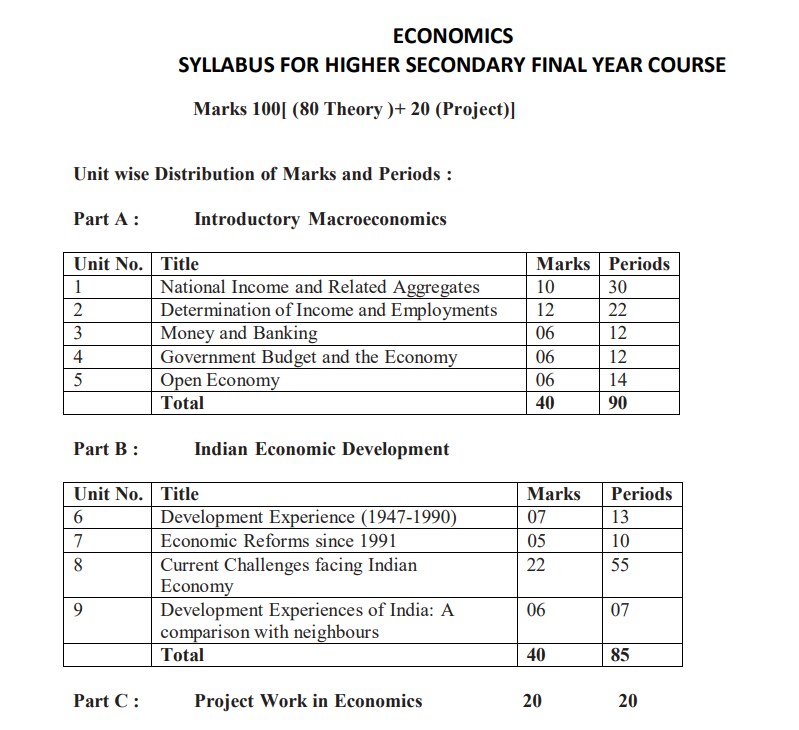 Below mentioned are the languages prescribed for the HS 2nd year syllabus 2025-26, Science, Commerce, and Arts.
Below mentioned are the languages prescribed for the HS 2nd year syllabus 2025-26, Science, Commerce, and Arts.
MIL Subjects:
a) Assamese
b) Bengali
c) Bodo
d) Hindi
e) Nepali
f) Urdu
g) Khasi
h) Garo
i) Mizo
j) Manipuri
k) Hmar
l) Alternative English
Assam AHSEC Syllabus 2025-26 for English
Students are advised to go through the syllabus of English to prepare better. Candidates must remember that English is the subject that is common in all three streams. Refer to the table below to know the marking scheme of the Assam HS syllabus 2025-26.
Sections | Marks |
Section A Reading Skills Reading an unseen prose passage | 10 |
Section B Advanced Writing Skills | 25 |
Section C Grammar Narration: Direct and Indirect 4 marks Voice 3 marks Tenses 5 marks Proposition 4 marks Transformation of Sentences 4 marks | 20 |
Section D (Prescribed Books) Flamingo Vistas | 30 15 |
Section A
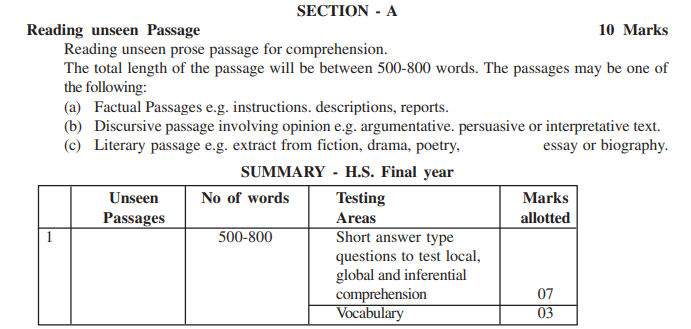
Section B
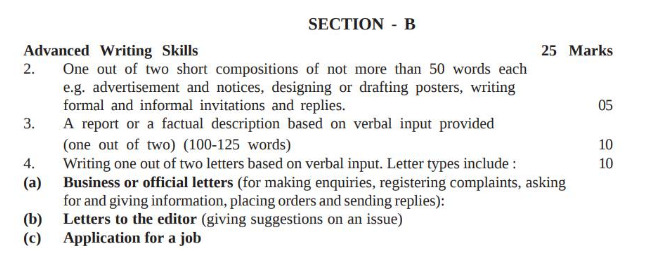
Section C

Section D
Prescribed Books | Chapter Name |
Flamingo |
|
Flamingo - Poetry |
|
Vistas |
|
Assam AHSEC Syllabus 2025-26 for Physics
Refer to the table to know the important topics and units of the Assam HS syllabus 2025-26 of Physics, along with the marking scheme to prepare for the exam in a planned manner.
Unit name | Important Topics | Marks |
Electrostatics | Chapter–1: Electric Charges and Fields Electric Charges; Conservation of charge, Coulomb's law-force between two point charges, forces between multiple charges; superposition principle and continuous charge distribution. Electric field, electric field due to a point charge, electric field lines, electric dipole, electric field due to a dipole, and torque on a dipole in a uniform electric field. Electric flux, statement of Gauss's theorem and its applications to find the field due to an infinitely long straight wire, a uniformly charged infinite plane sheet and a uniformly charged thin spherical shell (inside and outside). Chapter–2: Electrostatic Potential and Capacitance: Electric potential, potential difference, electric potential due to a point charge, a dipole and a system of charges; equipotential surfaces, electrical potential energy of a system of two-point charges and an electric dipole in an electrostatic field. Conductors and insulators, free charges and bound charges inside a conductor. Dielectrics and electric polarisation, capacitors and capacitance, combination of capacitors in series and parallel, capacitance of a parallel plate capacitor with and without a dielectric medium between the plates, energy stored in a capacitor. | 09 |
Current Electricity | Chapter–3: Current Electricity: Electric current, flow of electric charges in a metallic conductor, drift velocity, mobility and their relation with electric current; Ohm's law, electrical resistance, combination of resistance(series and parallel), V-I characteristics (linear and non-linear), electrical energy and power, electrical resistivity and conductivity, temperature dependence of resistance. Internal resistance of a cell, potential difference and emf of a cell, combination of cells in series and in parallel, Kirchhoff's laws and simple applications, Wheatstone bridge. | 08 |
Magnetic Effects of Current and Magnetism | Chapter–4: Moving Charges and Magnetism: Concept of magnetic field, Oersted's experiment. Biot-Savart law and its application to a current-carrying circular loop. Ampere's law and its applications to an infinitely long straight wire. Straight solenoids (only qualitative treatment), force on a moving charge in uniform magnetic and electric fields. Force on a current-carrying conductor in a uniform magnetic field, force between two parallel current-carrying conductors-definition of ampere, torque experienced by a current loop in a uniform magnetic field; Current loop as a magnetic dipole and its magnetic dipole moment, moving coil galvanometer, current sensitivity and conversion to ammeter and voltmeter. Chapter–5: Magnetism and Matter: Bar magnet, bar magnet as an equivalent solenoid (qualitative treatment only). Magnetic field intensity due to a magnetic dipole (bar magnet) along its axis and perpendicular to its axis (qualitative treatment only), torque on a magnetic dipole (bar magnet) in a uniform magnetic field (qualitative treatment only), and magnetic field lines. Magnetic properties of materials-Para-, dia-and ferro-magnetic substances with examples, Magnetisation of material. | 09 |
Electromagnetic Induction and Alternating Currents | Chapter–6: Electromagnetic Induction: Electromagnetic induction; Faraday's laws, induced EMF and current; Lenz's Law, Self and mutual induction. Chapter–7: Alternating Current: Alternating currents, peak and RMS value of alternating current/voltage; reactance and impedance; LCR series circuit (Phasor treatment only), resonance; power in AC circuits. AC generator and transformer. Power factor, Wattles current. | 09 |
Electromagnetic Waves | Chapter–8: Electromagnetic Waves: Basic idea of displacement current, Electromagnetic waves, their characteristics, their Transverse nature (qualitative ideas only). Electromagnetic spectrum (radio waves, microwaves, infrared, visible, ultraviolet, X-rays, gamma rays), including elementary facts about their uses. | 03 |
Optics | Chapter–9: Ray Optics and Optical Instruments: Ray Optics: Reflection of light, spherical mirror and mirror formula Refraction of light, total internal reflection and its applications, optical fibers, refraction at spherical surfaces, lenses, thin lens formula, Lens maker's formula, magnification, power of a lens, combination of thin lenses in contact, refraction of light through a prism. Optical instruments: Microscopes and astronomical telescopes (reflecting and refracting) and their magnifying powers. Chapter–10: Wave Optics: Wave front and Huygen's principle, reflection and refraction of a plane wave at a plane surface using wave fronts. Proof of laws of reflection and refraction using Huygen's principle. Interference, Young's double slit experiment and expression for fringe width (no derivation, final expression only), coherent sources and sustained interference of light, diffraction due to a single slit, width of central maximum (qualitative treatment only) | 14 |
Dual Nature of Matter and Radiation | Chapter–11: Dual Nature of Radiation and Matter Dual nature of radiation, Photoelectric effect, Hertz and Lenard's observations; Einstein's photoelectric equation-particle nature of light. Experimental study of the photoelectric effect. Matter waves-wave nature of particles, de-Broglie relation. | 05 |
Atoms and Nuclei | Chapter–12: Atoms: Alpha-particle scattering experiment; Rutherford's model of the atom; Bohr model, Bohr’s model of the hydrogen atom. Expression of radius of nth orbit, velocity and energy of electron, hydrogen spectra (qualitative treatment only). Chapter–13: Nuclei: Composition and size of nucleus, Nuclear force, Mass-energy relation, mass defect, binding energy per nucleon and its variation with mass number, nuclear fission, nuclear fusion. | 06 |
Electronic Devices | Chapter–14: Semiconductor Electronics: Materials, Devices and Simple Circuits Energy bands in conductors, semiconductors and insulators (qualitative ideas only) Intrinsic and extrinsic semiconductors, p and n type, p-n junction. Semiconductor diode, I-V characteristics in forward and reverse bias, application of the junction diode: diode as a rectifier. | 07 |
Total | 70 |
Assam AHSEC Syllabus 2025-26 for Mathematics
Students should look into the table mentioned below to know the important topics and marking scheme of the Assam AHSEC Maths exam.
Unit name | Important Topics | Marks |
Relations and Functions | Types of relations, Types of Functions, Inverse Trigonometric functions, Basic concepts, etc. | 08 |
Algebra | Matrices: Concept of a matrix and its notation and order, etc. | 14 |
Calculus | Continuity and Differentiability, Application of Derivatives, Integrals, etc. | 44 |
Vectors, Algebra, and Three-Dimensional Geometry | Vectors and scalars, magnitude and direction of a vector, Cartesian and vector equation of a plane, etc, etc. | 20 |
Linear Programming | Introduction, related terminology such as constraints, objective function, optimisation, different types of linear programming, etc. | 06 |
Probability | Multiplication theorem on probability. Conditional probability, independent events, total probability, Bayes' theorem, etc. | 8 |
Total | 100 | |
Assam AHSEC Syllabus 2025-26 for Biology
Students are advised to go through the table below to know the important topics and marking scheme of the Assam AHSEC Syllabus 2025-26 for Biology.
Unit name | Important Topics | Marks |
Group A - Botany | ||
Sexual Reproduction | Asexual Reproduction, Sexual Reproduction, Apomixis and Polyembryony, etc. | 5 |
Genetics and Evolution | Evolution of Life Forms- A Theory, Mechanism of Evolution, A Brief Account of Evolution, Origin and Evolution of Man, etc. | 5 |
Biology and Human Welfare | Animal Husbandry, Tissue Culture, Microbes in Sewage Treatment, Microbes as Biofertilisers, etc. | 4 |
Biotechnology and its application | Principles of Biotechnology, Tools of recombinant DNA Technology, Biotechnological Applications in Medicine, etc. | 12 |
Ecology | Organism and its Environment, Populations, Medicinal and Timber Yielding Plants, etc. | 9 |
Group B - Zoology | ||
Reproduction | Pregnancy and Embryonic Development, Medical Termination of Pregnancy, etc. | 8 |
Genetics and Evolution | Sex Determination, Replication, Human Genome Project, DNA Fingerprinting, etc. | 12 |
Biology and Human Welfare | Common Diseases in Humans, Drugs and Alcohol Abuse, Single Cell Protein, etc. | 5 |
Biotechnology and Its Application | Biotechnological Applications in Agriculture, Transgenic Animals, Ethical Issues, etc. | 1 |
Ecology | Ecological Pyramids, Biodiversity Conservation, Medicinal and Timber Yielding Plants, Degradation by Improper Resource Utilisation and Maintenance, etc. | 9 |
Total | 70 | |
Assam AHSEC Syllabus 2025-26 for Computer Science and Application
Candidates can check out the Assam exam routine 2026 to learn more about the exam dates for class 12. Go through the image below to know the syllabus and marking scheme of the Computer Science and Applications syllabus.
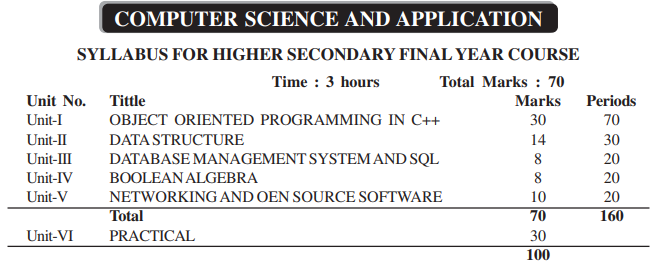
Assam AHSEC Syllabus 2025-26 for Commerce Stream
We have provided the syllabus for the HS 2nd year syllabus 2025-26 Commerce below.
Assam AHSEC Business Studies Syllabus 2025-26
Refer to the table below to know the units, important topics and marking scheme of Assam AHSEC Syllabus 2nd year for Business Studies.
Unit | Topics | Marks | |
PART-A | Principles and Functions of Management | ||
Unit-I | Nature and Significance of Management | Management- concept, objectives and importance, Management as Science, Art and Profession, Levels of Management, Management Functions- planning, organising, staffing, directing and controlling, Co-ordination- Concept and importance | 06 |
Unit-II | Principles of Management | Principles of Management- Concept and Significance, Fayol’s Principles of Management, Taylor’s Scientific Management- Principles and Techniques. | 06 |
Unit-III | Business Environment | Business Environment- Concept and importance, Dimensions of Business Environment- Economic, Social, Technological, Political and Legal, Economic Environment in India, Demonetization- Concept and Features. | 06 |
Unit-IV | Planning | Concept, Importance, Features and Limitations, Planning process, Single use and Standing Plans- Objective, Strategy, Policy, Procedure, Method, Rule, Budget and Programme. | 06 |
Unit-V | Organising | Concept and importance, Organising Process, Structure of Organisation –Functional and Divisional, Formal and Informal organisation- Concept, Delegation- Concept, elements and importance, Decentralisation- Concept and importance | 08 |
Unit-VI | Staffing | Concept and importance of staffing, Staffing as a part of Human Resource Management Concept, Staffing process, Recruitment Process and Sources, Selection Process, Training and Development- Concept and importance, Methods of Training- On the job and off the job-Vestibule training, Apprenticeship training and Internship training. | 06 |
Unit VII | Directing | Concept and importance, Elements of Directing, Motivation- Concept, Maslow’s hierarchy of needs; financial and Non-financial incentives, Leadership- Concept, styles, authoritative, democratic and laissez-faire, Communication- Concept, formal and informal communication, barriers of effective communication, how to overcome the barriers. | 08 |
Unit- VIII | Controlling | Controlling Concept, Importance and Limitations, Relationship between planning and controlling, Steps in the process of control | 06 |
PART-B | Business Finance and Marketing | ||
Unit-IX | a) Financial Management | Concept, role and objectives of Financial Management. Financial Decisions- Investment, Financing and Dividend- meaning and factors affecting, Financial Planning- Concept and Importance, Capital Structure- Concept and factors affecting Capital Structure, Fixed and Working Capital- Concept and factors affecting their requirements | 06 |
(b) Financial Markets | Financial Market- Concept, Money Market- Meaning, Capital Market and its types (primary and secondary), Stock Exchange- Functions and trading procedure, Securities and Exchange Board of India (SEBI) – Objectives and Functions | 08 | |
Unit-X | Marketing Management | Marketing- Meaning, functions and philosophies, Marketing Mix- Concept and elements, Product- Branding, Labelling and Packaging-Concept, Price- Concept, Factors determining price, Physical distribution- Concept, Components and Channels of distribution, Promotion-Concept and elements, Advertising, Personal selling, Sales promotion and publicity. | 08 |
Unit-XI | Consumer Protection | Concept and importance of consumer protection, The Consumer Protection Act 2019- Meaning of Consumer, Rights and Responsibilities of Consumers, Who can file a complaint. Redressal machinery, remedies available, Consumer awareness- Role of consumer organisation and Non-Government. Organisations (NGOs). | 06 |
Total (Theory) | 80 | ||
PART-C | PROJECT WORK | 20 | |
Total | 100 | ||
Assam AHSEC Accountancy Syllabus 2025-26 (Complete)
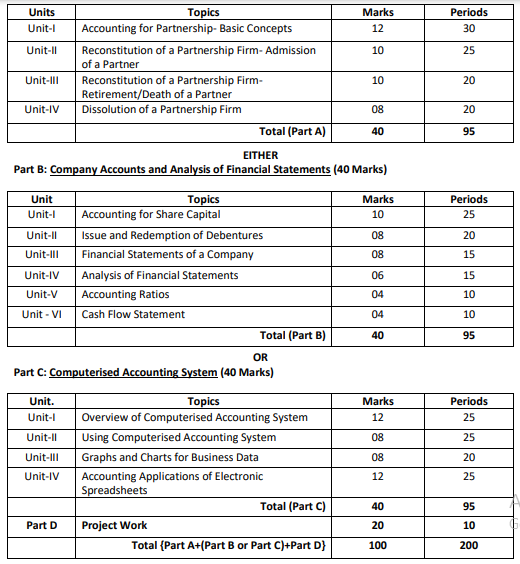
Assam AHSEC Syllabus 2025-26 for Arts (Complete)
We have provided the Arts subjects prescribed in the AHSEC Assam syllabus below. Students must discuss with their teachers or the school authority to know the detailed syllabus of AHSEC for the Arts stream. The AHSEC Assam Arts syllabus can also be downloaded in the form of a PDF file from the official website of the board. Find the list of Arts subjects below:
i) Economics
ii) History
iii) Political Science
iv) Logic & Philosophy or Psychology
v) Education
vi) Sociology or Anthropology
vii) Statistics
viii) Mathematics
ix) Home Science
x) (a) One of the following classical languages :
1) Arabic
2) Persian
3) Sanskrit
OR
(b) One of the following advanced languages :
1) Advanced Assamese
2) Advanced Bengali
3) Advance Hindi
4) Advance Manipuri
5) Advance Bodo
xi) Geography
xii) Computer Science & Application
xiii) Sattriya Dance
xiv) Fine Arts
xv) Entrepreneurship Development
xvi) Multimedia & Web Technology
Candidates should prepare the entire syllabus very well, as the Assam 12th question papers are prepared after referring to the prescribed syllabus. Hence, Students should go through the previous year's question papers to know the exam pattern and prepare accordingly. The board will release the Assam HS admit card in February. Referring to the syllabus, important topics, and the marking scheme will help the candidates to score good marks in the Assam HS result.
Frequently Asked Questions (FAQs)
Yes, the Assam HS syllabus for Mathematics is the same for Science and Arts students.
The minimum passing marks for all subjects is 30%. The qualifying marks for subjects having practical is 30% for theory part and 40% for practical part. Students must pass both theory and practical separately.
Questions related to Assam AHSEC
On Question asked by student community
Hello,
You can get Assam Half-Yearly Question Papers from this link : Assam Class 12th Half-Yearly Question Papers
Hope it helps !
Hello,
You can get the paper from this link : Assam Board Class 10th Half-Yearly Question Paper 2025-26
Hope it helps !
Hello,
Visit the below website to download the half yearly Science question paper of Assam AHSEC class 10.
https://school.careers360.com/boards/seba/assam-board-class-10-half-yearly-question-paper-2025-26
You'll also get the key answers from it. So, you can verify your answers and improve yourself if any mistakes.
Hi dear candidate,
On our official website, you can download the class 12th half yearly question papers of Assam Board with the link below.
https://school.careers360.com/boards/ahsec/assam-hs-class-12-half-yearly-exam-2025-question-paper
Answer key is also available within it.
BEST REGARDS
The AHSEC 12th Exam is the Higher Secondary (HS) Final Examination conducted by the Assam Higher Secondary Education Council for students in Class 12 across various streams like Science, Commerce, Arts, and Vocational in the state of Assam.
Applications for Admissions are open.
As per latest syllabus. Physics formulas, equations, & laws of class 11 & 12th chapters
JEE Main Important Chemistry formulas
Get nowAs per latest syllabus. Chemistry formulas, equations, & laws of class 11 & 12th chapters
JEE Main high scoring chapters and topics
Get nowAs per latest 2024 syllabus. Study 40% syllabus and score upto 100% marks in JEE
JEE Main Important Mathematics Formulas
Get nowAs per latest syllabus. Maths formulas, equations, & theorems of class 11 & 12th chapters
